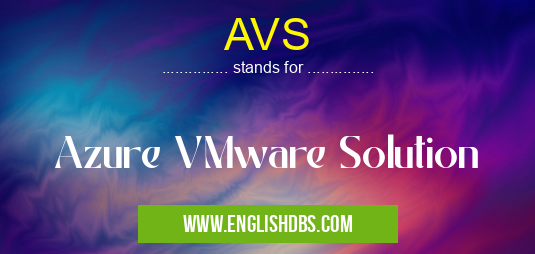What does AVS mean in UNCLASSIFIED
AVS - Azure VMware Solution is a cloud-based service that allows organizations to run VMware workloads on Microsoft Azure. It provides a fully managed, enterprise-grade VMware environment that can be deployed and managed through the Azure portal. AVS is designed to help organizations modernize their on-premises VMware environments and take advantage of the benefits of the cloud.

AVS meaning in Unclassified in Miscellaneous
AVS mostly used in an acronym Unclassified in Category Miscellaneous that means Azure VMware Solution
Shorthand: AVS,
Full Form: Azure VMware Solution
For more information of "Azure VMware Solution", see the section below.
Key Features and Benefits
- Fully Managed: AVS is a fully managed service that takes care of the underlying infrastructure, VMware software, and lifecycle management. This allows organizations to focus on their applications and workloads, rather than on managing the underlying infrastructure.
- Enterprise-Grade VMware Environment: AVS provides a VMware environment that is consistent with on-premises VMware environments. This allows organizations to easily migrate their VMware workloads to the cloud without having to re-engineer their applications.
- Integration with Azure: AVS is tightly integrated with Azure, allowing organizations to take advantage of a wide range of Azure services, such as storage, networking, and security. This integration makes it easy to build and deploy hybrid applications that span both on-premises and cloud environments.
Use Cases
AVS is ideal for organizations that want to:
- Modernize their on-premises VMware environments
- Migrate VMware workloads to the cloud
- Build and deploy hybrid applications
- Take advantage of the benefits of the cloud
Essential Questions and Answers on Azure VMware Solution in "MISCELLANEOUS»UNFILED"
What is Azure VMware Solution (AVS)?
Azure VMware Solution (AVS) is a Microsoft Azure service that enables you to run VMware workloads in a highly available and performant environment in the Azure cloud. It provides a turnkey solution that includes VMware vSphere, vSAN, and NSX, allowing you to migrate and run your existing VMware workloads to Azure without having to refactor your applications.
What are the benefits of using AVS?
AVS offers several benefits, including:
- Cost savings: AVS can help you save costs by reducing the need for on-premises infrastructure and by taking advantage of Azure's pay-as-you-go pricing model.
- Improved performance: AVS provides high-performance storage and networking capabilities that can improve the performance of your VMware workloads.
- Increased availability: AVS offers high availability features such as replication and failover, which can help ensure that your workloads are always available.
- Enhanced security: AVS provides security features such as encryption and access control, which can help protect your workloads from security threats.
What types of workloads can I run on AVS?
You can run a wide variety of VMware workloads on AVS, including:
- Virtual machines: You can migrate your existing virtual machines to AVS and run them in the Azure cloud.
- Containers: You can run containers on AVS using VMware Tanzu Kubernetes Grid.
- Databases: You can run databases on AVS using VMware vSphere with Tanzu.
- Other applications: You can run any other type of application that is supported by VMware vSphere.
How do I get started with AVS?
To get started with AVS, you will need to:
- Create an Azure subscription.
- Deploy an AVS private cloud in your Azure subscription.
- Migrate your VMware workloads to your AVS private cloud.
How much does AVS cost?
The cost of AVS depends on the size of your private cloud and the number of workloads that you are running. For more information, please refer to the Azure VMware Solution pricing page.
Final Words: AVS is a powerful cloud-based service that can help organizations modernize their VMware environments and take advantage of the benefits of the cloud. It provides a fully managed, enterprise-grade VMware environment that is tightly integrated with Azure. With AVS, organizations can easily migrate their VMware workloads to the cloud, build and deploy hybrid applications, and take advantage of a wide range of Azure services.
AVS also stands for: |
|
| All stands for AVS |
